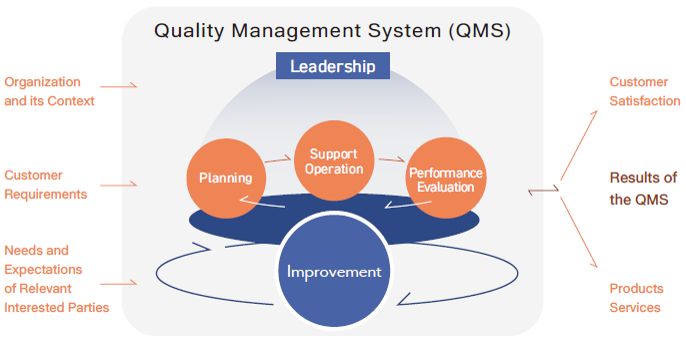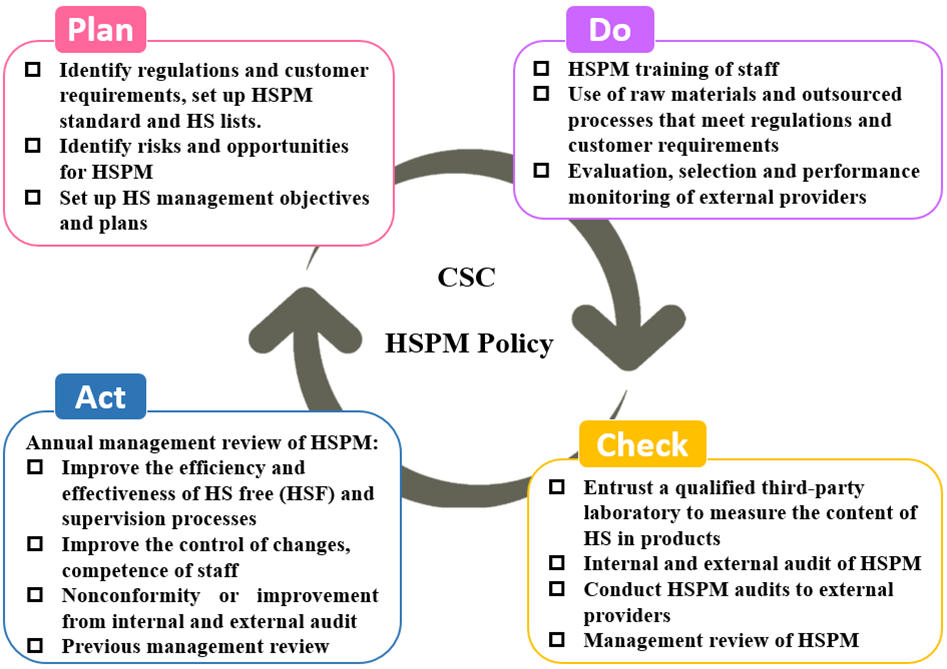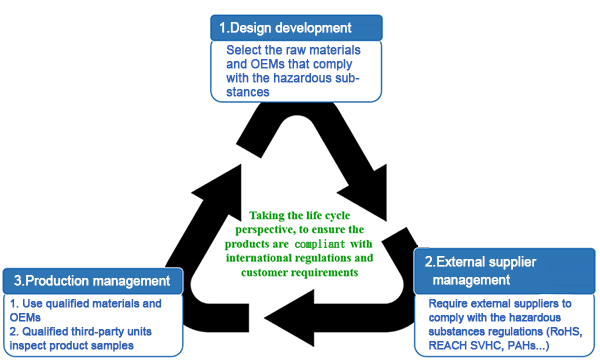Quality Control
Policy and Commitment
CSC adopted the international quality management system IATF 16949 and ISO 9001 to establish “Steel Product Quality Management System”, ensuring that all processes within the system are effectively executed, while continuously improving the management process and product quality.
CSC complies with the quality policy of "engaging in customer-oriented R&D and innovation to provide high-quality eco-friendly products and fulfill our corporate social responsibility," and gathers production, marketing, R&D, and technology resources under the business strategies of "developing advanced products, high-efficiency processes and product application technologies, and implementing smart manufacturing to increase the value chain of the steel industry " and "continue to reduce cost and shorten delivery time, and improve energy conservation and environmental protection." We focus on the product strategy of "higher grade, wider variety, and higher quality" so that CSC products will become higher-end and more refined to achieve sustainable development. CSC upholds the belief that "customers' perception of quality includes variation, and accuracy is equally as important as precision," and continues to improve customer satisfaction and enhance CSC’s overall competitiveness through multi-stage, multi-level technical services.
Quality Improvement
Adhering to the quality conviction of “No best quality, only better quality that exceeds customers' expectations”, CSC takes continuous improvement as the driving force for enhancing the product technology and product quality. Through the PDCA cycle as a core tool, with the experimental planning method, Taguchi method, and Six Sigma method used alternately to work out the cause analysis and the data stratification, CSC plans the improvement countermeasures matching the current situation and develops improvement project system. The flowchart of CSC's quality management system is as below:


While CSC's products are mainly based on the domestic market, it is committed to exploring overseas markets in consideration of the needs of overseas production bases and the related supply chains. The first step is to obtain the mandatory product certifications in various countries. CSC has, so far, obtained certifications from Japan, Malaysia, India, Thailand, Vietnam, Indonesia, Korea and the European Union. Moreover, CSC provides its customers with products that comply with overseas laws and regulations, ensuring seamless customs clearance and enhancing product competitiveness.
To support government policies, CSC has applied for and obtained the CNS certification mark. Customers seeking domestic public construction projects can be exempted from repeated sampling tests and reduce their material costs. The interests of CSC and customers have been considered, which is not only a win-win situation for both but also demonstrates CSC's leading role in supporting the government's policies.
CSC has been a long-term supplier of galvanized steel products used in the manufacturing of electronic product casings for customers. In November of 2021, the SGCC RC12 steel products passed the UL 2809 Recycled Content validation, making CSC the first UL-certified steel mill in the world. In alignment with the environmentally friendly strategies of 3C (computers, consumer electronics, and communication) electronic brand manufacturers, CSC has continued to research and develop steel products with a higher content of recycled materials. So far, CSC has been granted several UL 2809 certificates, including Hot Rolled Steel Coil, Cold Rolled Steel Coil, Zinc Coated Steel Coil, Magnetic Steel coil, Wire rod and Bar, which not only fulfills CSC's commitment to the ESG development but also provides customers with better choices. CSC will actively pursue the development of production technology with an even higher content of recycled materials and continuously advance towards the path of a circular economy in the future.
Policy and Commitments
Hazardous Substance Process Management (HSPM) is a part of achieving sustainable development, and CSC has established its hazardous substance process management system through the implementation of IECQ HSPM QC 080000 Hazardous Substance Process Management. Internal and external audits and management reviews on the IECQ HSPM QC 080000 Hazardous Substance Process Management System are conducted regularly each year to realize ongoing improvements. In the initial stage of procurement, we adopted the perspective of product life cycle (PLC) and do not use raw materials that contain hazardous substances. In the process design and development stage, we avoid using raw materials that contain hazardous substances in processes based on the principle of green design. We have control measures in place for the production process of contractors and suppliers, so as to ensure that products meet international environmental laws and regulations and customer requirements, and do not create potential risks to the environment, health, or safety.
CSC's product quality policy is to: "engage in customer-oriented R&D and innovation to provide high quality eco-friendly products and fulfill our corporate social responsibility." The Metallurgical Department established the annual operational goals of "Compliance of steel products with regulatory requirements on hazardous substance content (including products from outsourced processes) reaches 100%" under the policy. Related plants and departments review the processes they are responsible for based on their business attributes, conduct risk management and assessment for materials and compile a control list of hazardous substances. Suppliers are required to provide a hazardous substance statement or hazardous substance analysis report, depending on the assessed risk level during raw material procurement. This controls hazardous substances from the source (raw materials, processes, quality, and packaging) and reduces or eliminates hazardous substances in products, ensuring that all products (including outsourced products) comply with requirements set forth in IECQ HSPM QC 080000 Hazardous Substance Process Management System, which increase customer satisfaction and enabled us to maintain zero customer complaints in hazardous substance process management. Furthermore, we periodically organize training on the hazardous substance process management system, and offered e-learning courses for re-training during the pandemic to ensure HSPM ability. We also include external audited personnel in the training course on the new version QC 080000 system, in order to strengthen our guarantee of HSF (Hazardous Substances Free) goal.
CSC has further formulated regulations regarding customer complaints, claims, and emergency recalls, and offers customers' feedback on CSC's steel products to the factories.

Product Life-Cycle Perspective Control
We avoid using raw materials that contain hazardous substances during the procurement, product design and development stage, and reduce the use of alloys that contain SVHC (Substances of Very High Concern) in the manufacturing process. As for outsourcing, the contracts ensure that products comply with international regulations and meet customer requirements. In the material selection stage, restricted substances that have a major impact on the environment, such as: the EU RoHS, REACH-SVHCs, packaging regulations, Germany's AfPS GS PAHs, California Proposition 65, Montreal Protocol on Substances that Deplete the Ozone Layer, and restricted substances specified by international motor vehicle manufacturers, are all closely monitored and included in the scope of control.
In terms of outsourcing and management of raw material suppliers, CSC requires contractors and raw material suppliers to comply with the hazardous substance restrictions of CSC or its customers and provide a "Statement of Compliance with CSC Restriction of Hazardous Substances." This reduces hazardous substances during the early stages of the PLC, and extends CSC's restriction of hazardous substances to contractors and raw material suppliers, ensuring that CSC's products do not contain hazardous substances from the source.
CSC has included the indicator "Hazardous substance content of steel products (including products from outsourced processes) meets the statutory conforming rate" as an internal management goal for control and tracking. To ensure that products comply with international regulations and customer requirements, CSC sends samples of steel products and critical raw materials to a third party external verification institution that complies with IEC 62321 and has obtained ISO 17025 certification for TAF laboratories, using objective data to prove that CSC's products meet requirements. This fully shows that CSC's products do not contain hazardous substances, and the quality of all products complies with international regulations and meet customer requirements.

Training Programs
To meet HSF requirements and the latest IECQ regulations, CSC periodically offers related courses for employees to understand changes in international regulations, with training participants including first-level, second-level, and third-level supervisors and all professional personnel in units related to hazardous substance process management for the steel product system. We offer the course "IECQ HSPM QC 080000 Hazardous Substance Process Management System" to ensure that employees understand regulations and development trends related to hazardous substances, control methods and HSPM operations, the history and development of HSPM, and the meaning of QC 080000 articles, in order to meet requirements on organizational knowledge specified in articles of the IECQ system. We added "deadline for completing training" to the training system and offered the online course "hazardous substance process management" according to external audit requirements of the BSI, ensuring that employees have the abilities required for hazardous substance process management.
